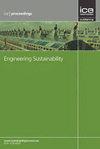基于自然的工程解决方案(NBS) -检查有效干预的障碍
IF 1.5
4区 工程技术
Q3 ENGINEERING, CIVIL
Proceedings of the Institution of Civil Engineers-Engineering Sustainability
Pub Date : 2022-02-16
DOI:10.1680/jensu.21.00033
引用次数: 2
摘要
越来越多的研究机构正在研究基于自然的解决方案(NBS)如何为规划者、政治家和工程师提供选择,以促进对广泛的生物物理和社会经济问题的反应。然而,尽管国家统计局越来越受欢迎,但关于这些“解决方案”如何与城市问题相结合、在何种规模上它们最有效、以及与城市自然投资相关的成本等方面的分析有限。本文通过对欧盟资助的“地平线2020”(Horizon 2020)资助项目“城市绿化”(urban GreenUP)在英国利物浦的研究,分析了当前城市可持续发展的方法,以解构修辞如何转化为NBS干预措施的实际应用。本文探讨了国家统计局的项目、政策和政治支持之间的相互作用,并认为要成功解决城市气候变化脆弱性问题,需要对规模、功能和位置进行综合理解。这是在与其他欧盟资助项目有关的国家统计局更广泛讨论的背景下进行的。报告的结论是,尽管对国家统计局的投资为发展提供了一种有用的方法,但如果不注意一直存在的同样的障碍,它们就无法克服环境改善投资的现有障碍。此外,本文认为,只有当问题是透明和协作的定义时,促进国家统计局作为问题的解决方案才有效。本文章由计算机程序翻译,如有差异,请以英文原文为准。
Engineering Nature-Based Solutions (NBS) – examining the barriers to effective intervention
A growing body of research is examining how Nature-Based Solutions (NBS) are offering planners, politicians and engineers options to promote respond to a wide range of biophysical and socio-economic problems. However, despite the increasing popularity of NBS, there is limited analysis available on how these ‘solutions’ align with urban problems, at what scale they are most effective, and what costs are associated with investment in urban nature. This paper analyses current approaches to urban sustainability via an examination of the EU Funded Horizon 2020- funded project, URBAN GreenUP, in Liverpool (UK) to deconstruct how rhetoric translates to practical applications of NBS interventions. It interrogates the interactions of projects, policies and political buy-in for NBS, and argues that an integrated understanding of scale, function, and location is needed to successfully address issues of urban climate change vulnerability. This is contextualised against the wider discussions of NBS associated with other EU-funded projects. It concludes that although investment in NBS offer a useful approach to development, they cannot overcome existing barriers to investment in environmental improvements without attention to the same barriers that have always existed. Moreover, the paper argues that the promotion of NBS as solutions to problems is only effective when the problems are transparently and collaboratively defined.
求助全文
通过发布文献求助,成功后即可免费获取论文全文。
去求助
来源期刊

Proceedings of the Institution of Civil Engineers-Engineering Sustainability
ENGINEERING, CIVIL-ENGINEERING, CIVIL
CiteScore
3.70
自引率
16.70%
发文量
44
审稿时长
>12 weeks
期刊介绍:
Engineering Sustainability provides a forum for sharing the latest thinking from research and practice, and increasingly is presenting the ''how to'' of engineering a resilient future. The journal features refereed papers and shorter articles relating to the pursuit and implementation of sustainability principles through engineering planning, design and application. The tensions between and integration of social, economic and environmental considerations within such schemes are of particular relevance. Methodologies for assessing sustainability, policy issues, education and corporate responsibility will also be included. The aims will be met primarily by providing papers and briefing notes (including case histories and best practice guidance) of use to decision-makers, practitioners, researchers and students.
 求助内容:
求助内容: 应助结果提醒方式:
应助结果提醒方式:


